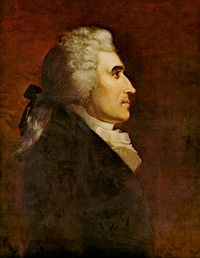Jonathan Dayton facts for kids
Quick facts for kids
Jonathan Dayton
|
|
|---|---|
 |
|
| 3rd Speaker of the United States House of Representatives | |
| In office December 7, 1795 – March 3, 1799 |
|
| Preceded by | Frederick Muhlenberg |
| Succeeded by | Theodore Sedgwick |
| United States Senator from New Jersey |
|
| In office March 4, 1799 – March 3, 1805 |
|
| Preceded by | Richard Stockton |
| Succeeded by | Aaron Kitchell |
| Member of the U.S. House of Representatives from New Jersey's at-large district |
|
| In office March 4, 1791 – March 3, 1799 |
|
| Preceded by | James Schureman Elias Boudinot |
| Succeeded by | Mark Thomson John Condit |
| Personal details | |
| Born | October 16, 1760 Elizabethtown, Province of New Jersey, British America |
| Died | October 9, 1824 (aged 63) Elizabethtown, New Jersey |
| Political party | Federalist |
| Other political affiliations |
Pro-Administration |
| Spouse | Susan Williamson |
| Parent | Elias Dayton (father) |
| Relatives | George Dayton (great-grandson) |
| Alma mater | College of New Jersey |
| Profession | Lawyer |
| Signature | |
Jonathan Dayton (October 16, 1760 – October 9, 1824) was an important American leader from New Jersey. He is known as one of the Founding Fathers of the United States. He was the youngest person to sign the Constitution of the United States. This important document created the government we have today.
Dayton served in the United States House of Representatives, where he became its third Speaker. Later, he also served in the U.S. Senate. His political career was affected by his connection to a controversy involving Aaron Burr.
Contents
About Jonathan Dayton
His Early Life and Education
Jonathan Dayton was born in Elizabethtown, New Jersey, which is now called Elizabeth. His father, Elias Dayton, was a successful merchant and a local politician. Elias also served as a military officer in the French and Indian War.
Jonathan went to a local school where he was classmates with Alexander Hamilton, another famous American leader. He then attended the College of New Jersey, which is now known as Princeton University. In 1775, he left college to join the fight in the American Revolutionary War. He later received an honorary degree from the college in 1776.
A Soldier in the Revolution
Jonathan Dayton was only 15 years old when the American Revolutionary War began in 1775. He joined the army and served under his father in the 3rd New Jersey Regiment. He started as an ensign, which is a junior officer rank.
By 1777, he was a lieutenant and helped manage the army's payments. He fought alongside General George Washington in important battles like Brandywine Creek and Germantown. He also stayed with Washington's army during the difficult winter at Valley Forge.
In 1780, Dayton and his uncle were captured by Loyalists, who were people loyal to the British. They were held captive for a winter before being released. Dayton continued to serve in the New Jersey Brigade. At age 19, he was promoted to captain and took part in the Battle of Yorktown. This battle was a major victory that helped end the war.
After the war, Dayton became an original member of The Society of the Cincinnati. This group was formed by officers who fought in the Revolutionary War.
His Political Career
After the war, Jonathan Dayton became a lawyer. He spent his time working as a lawyer, investing in land, and getting involved in politics. He was a delegate for New Jersey in the Continental Congress. He also attended the Constitutional Convention. At 26, he was the youngest member to sign the U.S. Constitution.
Dayton was a strong supporter of the Federalist Party. He served in the New Jersey state government in different roles. He was a member of the New Jersey General Assembly and the New Jersey Legislative Council.
In 1791, Dayton was elected to the United States House of Representatives. He served as the Speaker of the House for two terms. As Speaker, he was a key leader in the House. He supported the financial plans of Alexander Hamilton. He also helped put down the Whiskey Rebellion, a protest by farmers against a tax on whiskey.
Dayton was very wealthy from his investments in land, especially in Ohio. The city of Dayton, Ohio, was later named after him. He became involved in a political controversy with Aaron Burr. While he was cleared of any wrongdoing, this association greatly affected his political career.
Later Life and Family
Jonathan Dayton married Susan Williamson in 1779. They had two daughters together.
After his time in national politics, Dayton continued his political career in New Jersey. He passed away on October 9, 1824, in his hometown of Elizabeth. He was buried in an unmarked grave beneath St. John's Episcopal Church in Elizabeth.
Shortly before he died, the famous French general Lafayette visited him. Lafayette was a hero of both the American and French Revolutions.
His Legacy
Jonathan Dayton's name lives on in several places. The city of Dayton, Ohio, is named after him. He owned a large amount of land in that area.
Other places named in his honor include:
- Jonathan Dayton High School in Springfield Township, New Jersey.
- The Dayton neighborhood in Newark, New Jersey.
- Dayton Street in Madison, Wisconsin.
- The town of Dayton, New Jersey.
Images for kids
See also
 In Spanish: Jonathan Dayton para niños
In Spanish: Jonathan Dayton para niños
 | Selma Burke |
 | Pauline Powell Burns |
 | Frederick J. Brown |
 | Robert Blackburn |


